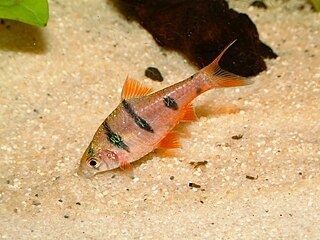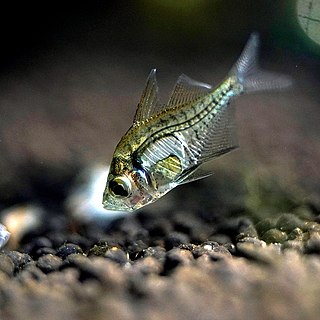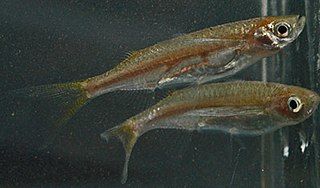
Puntius is a genus of small freshwater fish in the family Cyprinidae native to South Asia and Mainland Southeast Asia, as well as Taiwan.

The six-banded tiger barb is a Southeast Asian species of cyprinid fish native to blackwater streams, peat swamps and other freshwater habitats with little movement in the Malay Peninsula, Sumatra and Borneo. Although there are reports from the Mekong basin, this is generally consider to be outside the range of the genus Desmopuntius. D. hexazona has often been confused—especially in the aquarium trade—with the less widespread, closely related D. pentazona, which is similar except that it has a black spot at the rear base of its dorsal fin. Although overall relatively widespread, D. hexazona is considered threatened in Singapore. This species reaches a total length of 5.5 cm (2.2 in).

Parambassis is a genus of freshwater fish in the Asiatic glassfish family Ambassidae of order Perciformes. The type species is the Iridescent glassy perchlet. These fishes originate mostly from Southeast Asia, but the species range across the Indomalayan and Australasian realms, from Pakistan, China and India south through Indonesia, New Guinea and Australia. Although primiarly found in fresh water, a few species can also be seen in brackish water. The Parambassis species range in maximum size from 4–24 cm (1.5–9.5 in), but they are similar in appearance, with a lozenge-shaped form, typical perciform fins, and semitransparent or transparent body. Several of the species are common food fish in local markets, and some are kept as aquarium fish.

Parachela is a genus of cyprinid fishes. There are currently seven species in this genus which are found in Southeast Asia.

Leptobarbus is a genus of cyprinid fish that are native to freshwater habitats in Southeast Asia. They are important food fish. It is the only genus in the subfamily Leptobarbinae. Leptobarbus hoevenii or "sultan fish" migrate the fresh water rivers of Malaysia and travel at the surface in schools of 40-80 individuals at speeds of 0.48-1.08 km. Acid-soluble collagen (ASC) and pepsin-soluble collagen (PSC) were extracted from the muscles of selected cultured catfish, red tilapia, black tilapia, pangasius catfish, sultan fish and labyrinth fish, freshwater fishes that are widely consumed in Malaysia. The extracted yields for the tested species were higher for PSC as compared with ASC.

Barbodes is a genus of small to medium-sized cyprinid fish native to tropical Asia. The majority of the species are from Southeast Asia. Many species are threatened and some from the Philippines are already extinct. A survey carried out in 1992 only found three of the endemic Barbodes species, and only two were found in 2008. Several members of this genus were formerly included in Puntius.

Acheilognathus is a genus of cyprinid fish native to Asia. The name is derived from the Greek a, meaning "without", the Greek cheilos, meaning "lip", and the Greek gnathos, meaning "jaw".
Discherodontus halei is a species of cyprinid fish from Southeast Asia. It appears to have a disjunct range; it is known from Pahang River in western Peninsular Malaysia and from the Tapi River in southern Thailand, as well as from the northern Chao Phraya River basin, Thailand. This species can reach a length of 10.5 centimetres (4.1 in) TL.

Poropuntius is a genus of cyprinid fish found mainly in freshwater habitats of Southeast Asia and Yunnan in China, but P. burtoni is from South Asia. Several species have highly restricted ranges and are threatened, and a single P. speleops is a cavefish.
Pterocryptis is a genus of sheatfish. These fish are medium-sized catfishes usually found in fast flowing mountain streams throughout India, southern China and Southeast Asia. There are two cavefish species in the genus, P. buccata and P. cucphuongensis.

An anchovy is a small, common forage fish of the family Engraulidae. Most species are found in marine waters, but several will enter brackish water, and some in South America are restricted to fresh water.
Discherodontus colemani is a species of cyprinid fish. It is endemic to Thailand and restricted to the upper Chao Phraya River basin. It is an uncommon species that inhabits streams and river tributaries, occasionally the mainstreams.
Mekongina is a genus of cyprinid fish found in Southeast Asia and China.

Mystacoleucus is a genus of cyprinid fishes that are found in Southeast Asia. There are currently eight described species in this genus.

Opsarius is a genus of fish. Its representatives can be found in a variety of countries in South East Asia. These countries include Cambodia, Laos, Thailand, Myanmar, India, and China. Certain species of Opsarius are considered endemic to their respective habitats; such as Opsarius cocsa and Opsarius maculatus which are endemic to India.

Osteochilus is a genus of cyprinid fishes mainly found in Southeast Asia with a few extending into adjacent parts of China. Additionally, two species are endemic to the Western Ghats in India.

Systomus is a genus of fish in the family Cyprinidae native to tropical Asia.

Hoplichthys, the ghost flatheads, is a genus of marine ray-finned fishes native to the Indian and Pacific Oceans. This genus is the only member of the family Hoplichthyidae.
Papuligobius is a genus of fish in the goby subfamily, Gobionellinae, native to Southeast Asia. It was erected in 2003 to house the species P. uniporus, newly described from Laos. A second species, P. ocellatus, was transferred from genus Rhinogobius at the same time.













